So, you’ve decided to run a half-marathon and it’s about 8-10 weeks away. Where do you start? How do you train for a longer race? How much running should you do? What about nutrition for runners? If you have the same questions, I’m here to give you my tips on how to put together an 8-week half marathon training schedule and how to optimise your nutrition for longer runs.

First of all, if you’ve stumbled on this post and you have no idea who I am, let me introduce myself. My name is Irena and I am a food and recipe blogger, nutrition advisor, cookbook author, rock climber and occasional runner. You can read more about me here.
Most people come to my blog for recipes but sometimes I share other healthy living ideas and experiences. And, since I recently completed a course in nutrition for sports performance AND I decided to sign-up for a half-marathon, I thought I’d put together this post about how I plan to train, my nutrition tips and anything else that might come in handy.
My Running Story

If you’re completely new to running, the thought of a long-distance race might seem like an unachievable dream. I know this because I have been there before. I started running 15-16 years ago (I am now 42). I was one of those people who thought running was bad for my knees and used any excuse not to take it up. Are you that person?
Then, a friend challenged me to City To Surf, a 14.5km fun race in Sydney. I don’t know why but I felt compelled to give it a go. We had 3 months! We agreed to train and do the race even if walked half of it.
I trained a few times a week, starting out with 1.5-2km per runs, slowly increasing my distance. Before I knew it, I could run for 45-60 minutes, even if not very fast. I did the City To Surf and the sense of achievement was absolutely amazing, not to mention the endorphins and the beers afterwards. I got hooked on running.
A few years later, I thought if I can do 14k, I am not that far away from a half-marathon (21k). We had a family health crisis at the time, and lots of personal life drama and I was looking for a distraction. A new challenge seemed very fitting. I signed up for the Sydney half-marathon and raised money for a cancer charity (extra incentive!).
There was A LOT of running in the lead-up. The race itself was hard but enjoyable. I hated kilometres 15 to 18. I had to push myself. The last 2 kilometres were fun. I got that second (last) wind, the corse wrapped around the Sydney Harbour with the Opera House glistening in the sun. My friends came to cheer me on and I was high on good vibes.
I remember saying to myself that I was happy to have done it but I wouldn’t do it again. For the next 10 years, I kept up with shorter runs but have discovered other activities like rock climbing and surfing.
For me, running has become like self-care. I’m not a fast runner, more of a jogger. I enjoy running outdoors and I take my running shoes on trips and love going for a jog in a new city. My favourite is running on the beach but I don’t get to do that as often living in London.
Why Do A Half-Marathon, Again?
These days, I do shorter, more leisurely runs (4-5km) a few times a month. I have done a few fun races in the last 5 years but no more than 10 km. And, I sometimes go for weeks without running. I truly thought my long-distance running days were over.
So, why on earth did I just sign up for another half-marathon?
I was partially inspired by my friends, who all seem to be obsessed with long-distance races and trail running. A few of them were signing up for the Lulworth Cove Trail Run. It’s in Dorset, along the Jurrasic Coast, which I love. I’ve always thought it would be a beautiful run, although it’s hilly and the weather can be questionable.
At first, I thought about signing up for the 10k route. This would have been low-commitment with minimal training required as I could probably shape up in 2-3 weeks. Then I realised that I wanted all the training, the grit and the challenge that came with doing a longer race. I wanted something that would make me go for a run more than once a week. I needed a kick up the butt to get fitter and more focused.
So, here we are! My half-marathon trail race is on March 21st, which is 8 weeks away. I’m going to follow a loose training plan I’ve put together and use the nutritional strategies I’ve learnt in my course.
8-Week Half-Marathon Training Schedule
Finally, to the nitty-gritty of this post and the reason you’re probably reading this. Here is my 8-week training plan, which is designed around my other activities like climbing. I’ve adapted a few available training schedules and got my more experienced long-distance running friends to provide feedback.
This half-marathon training plan is more of a template and you can adapt it to suit your weekly schedule and needs. You might only be able to do one short run during the week and that’s fine as long as you start including those longer runs on weekends to build up your endurance.
The plan is closer to 9 weeks but Week 1 is optional and is handy if you need to start with shorter distances to get your body into it. You might even start with 2km, 3km and 4km in the first week and build up from there.
My race is a trail run with quite a few hills. That’s why I’ve got a few running sessions with hills thrown in. If you’re running a flat race, you can probably skip that.
I don’t have a time goal because I’ve never done a long trail run and there are too many variables that could affect it such as weather, the state of the trail, hills, how I feel on the day and so on.
My last half-marathon (mostly flat) was about 2 hours and 10 minutes, so if I come anywhere between that and 3.5 hours, I will be pretty chuffed with myself. To help me improve my speed, I will be doing a few interval training sessions with quick spurts of sprinting with a minute or so of walking.
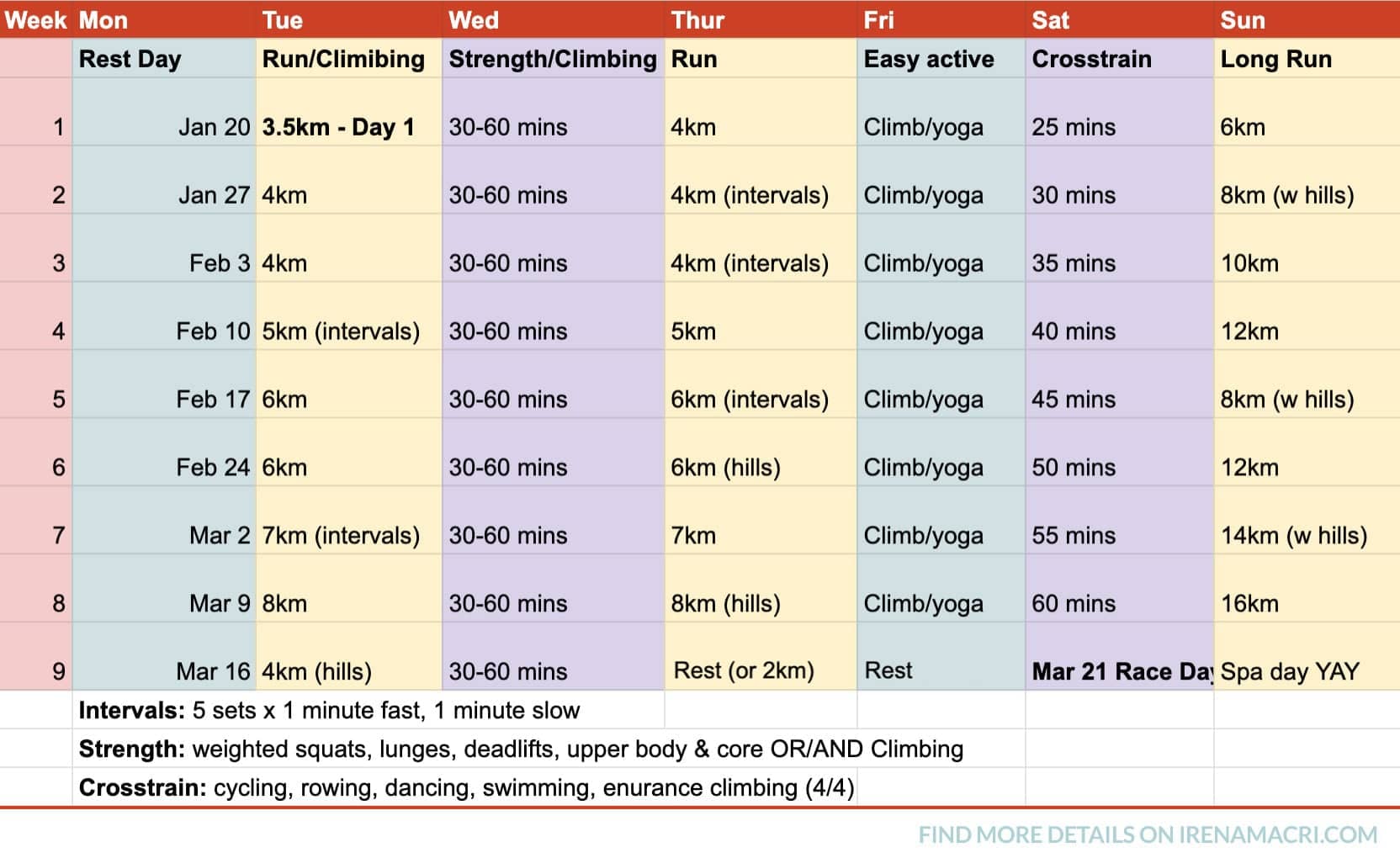
Half-Marathon Nutrition
Your running performance and training energy are greatly affected by what you eat. But, people often underestimate how much energy (and the type of energy) endurance activities such as long-distance running require.
I knew a lot about nutrient-dense eating for health and weight loss but I certainly wasn’t aware of all the ins and outs of sports nutrition until I started studying this topic. What I’ve learned has given me new insights that I will be applying during my training.
So, what should you eat while training for a half-marathon?
Your body uses both carbohydrates and fat for energy. During aerobic exercises, such as running, the use of carbohydrates relative to fat depends on a few factors: the intensity of exercise, the duration of exercise, your fitness level and your pre-exercise diet.
The higher the intensity of the exercise, the more your muscles will be relying on glycogen stores (the carbs you eat).
Lower intensity, shorter runs can easily be fueled by fat and a lower-carbohydrate diet with plenty of fat. But, even with little muscle glycogen available, you still need some carbs to burn fat for energy. If you eat fruit and veggies, that will be enough.
For example, long walks and light jogs (under 30-45 minutes) will mostly utilise fat for energy. This is why you can easily go for a walk or a jog while fasted or while eating low-carb. You are not going to the wall, so to speak.
However, the higher intensity workouts and endurance (long) exercise sessions tend to go better with higher carbohydrate intake and larger muscle glycogen stores. So, for example, sprinting sessions and long runs over 45-60 minutes, will need carbohydrates for best output. Your body will still use both glycogen and fat (including body fat) in that training session, especially the long runs.
Interestingly, as a result of aerobic training, your muscles make a number of adaptations and your body’s ability to use fat as fuel improves. As you get fitter, your body is able to break down fat faster at any given intensity and allows you to spare glycogen, which will A) delay fatigue and B) allow you to run at a higher intensity for longer.
Following a low-carb or ketogenic diet might help your body to be adapted to using fat for fuel but so far most of the studies point to glycogen still being the preferred fuel source for higher intensity and endurance activities. This might be different for other types of activities like walking, gentle jogging, yoga, light swimming.
Many endurance athletes also follow a cyclical training protocol, where they will go through a low-carb stage to get their bodies adapted to fat-burning but then carb load before longer sessions and event races. This is a strategy you might like to explore.
Tips For Optimising Nutrition For Running
Make sure you’re consuming enough calories, whether it’s from a high-carb, low-carb or mixed diet. There is no need to go overboard but be careful to not undereat as you need enough food not just to train but also to recover.
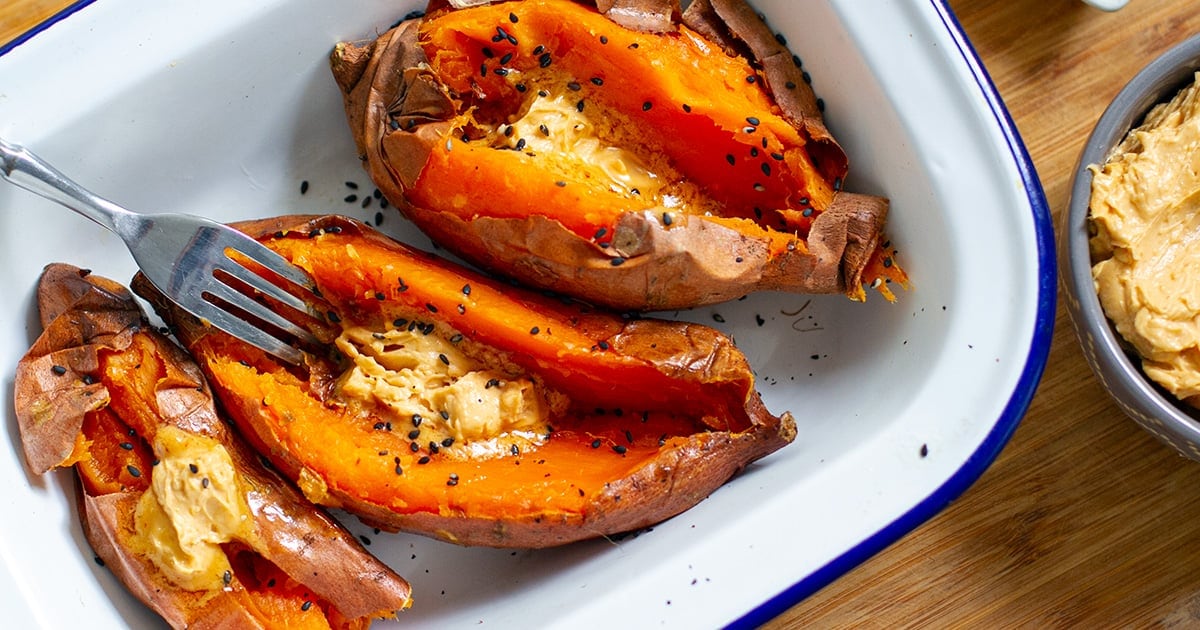
- Eat nutrient-dense foods and focus on extra antioxidants, because longer, more frequent workouts will be causing some oxidative and inflammatory stress on the body. I will be taking extra Vitamin C, E and omega-3 fatty acid. You can also focus on foods high in these nutrients as well as selenium and zinc (think lots of fruit and veg, oily fish, seafood, nuts, seeds, and avocados).
- Eat higher carbohydrate meals the day before AND a couple of hours before your longer running sessions (more than 60 minutes), strength training sessions (e.g. lifting weights) and sessions when you’re doing sprints, high intervals. Think 5-7 grams of carbohydrates per body weight daily. So say for a 60kg male, it would be 300-350 grams of carbohydrates. Sounds like a lot but that will be used up for energy during those harder workouts.
- Focus on low-GI carbs from starchy root vegetables and fruit, legumes, high-fibre grains. If you’re sticking with a gluten-free diet, focus on lots of root veggies (potatoes, yams, plantains, pumpkin, bananas), quinoa, buckwheat, rice and rice noodles, beans/lentils, corn, peas, potatoes and bananas, to name a few foods.
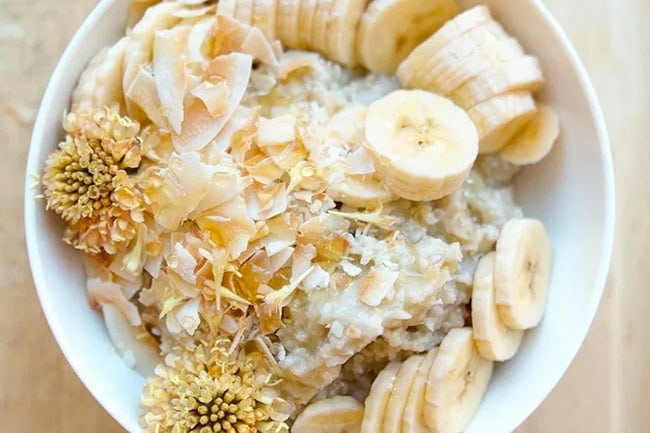
- Feel free to eat lower-carb the day before a shorter, easier running session, before a rest day or on days with other lighter activities. Get plenty of healthy fats and protein for muscle recovery. You need 1-2 g of protein per body weight. I always go for more protein straight after a strength session, including the day after for optimal recovery and muscle growth.
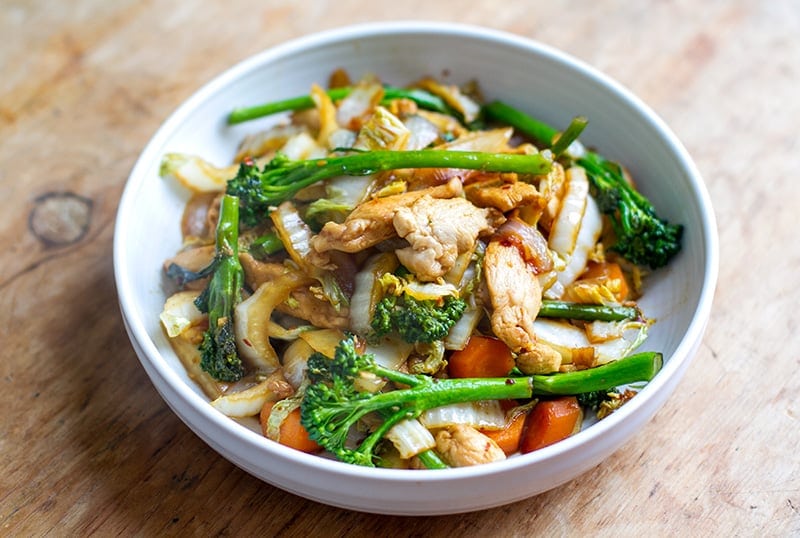
- During long runs over 60 minutes, I plan to have water mixed with some juice and salts for easy-to-absorb glucose and electrolytes. Coconut water is great! For really long runs, you can also carry some dried apricots in your pocket for a quick glucose boost. I used high-glucose gels in my last half-marathon and I really don’t like them so I will be trying dried fruit and maybe making some white rice balls.
Hydrate, hydrate, hydrate!
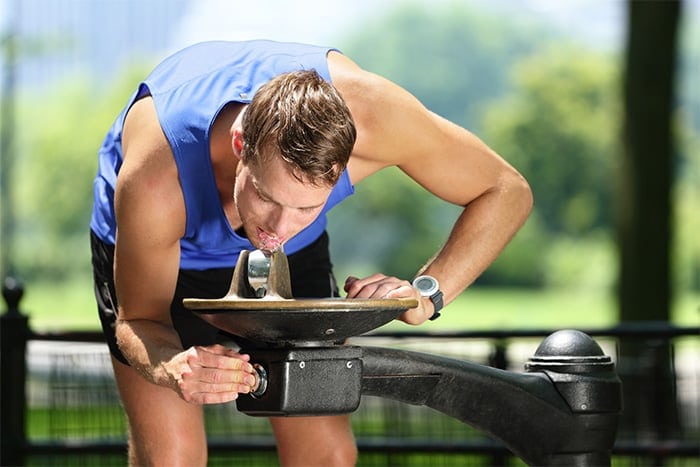
If you’re burning 2500 calories a day, you should be drinking 2.5L in liquid (that’s a general rule of thumb). Try to hydrate with 300-700 ml of fluid 2 to 4 hours prior to exercise.
When exercising, drink according to thirst. For most athletes, an intake of 400-800 ml per hour prevents dehydration as well as overhydration (which can be dangerous).
After exercise, drink as much liquid as your body lost in weight/sweat, plus some. You can weigh yourself before and after the run to find out how much weight you lose (which will be mostly water), then drink that amount plus 20% more to rehydrate.
There you go, guys! That’s what I plan to do as my half-marathon training. I’m not a running expert by any means and this is my personal approach. Feel free to draw inspiration and ideas from this post as you will.
There are other things to discuss such as how to fit training into a busy schedule, best running gear and gadgets, how to bring water and snacks on long runs, music or no music, favourite podcasts to listen to, tracking apps and so on. I might do a follow-up post later in my training to go over these topics.
If you’re planning to do a long-distance running race, you’re training for one, or you’ve done one before, I’d love to hear from you. What has your experience been like? What have you learned? How did you cope with challenges and obstacles and what were they for you?
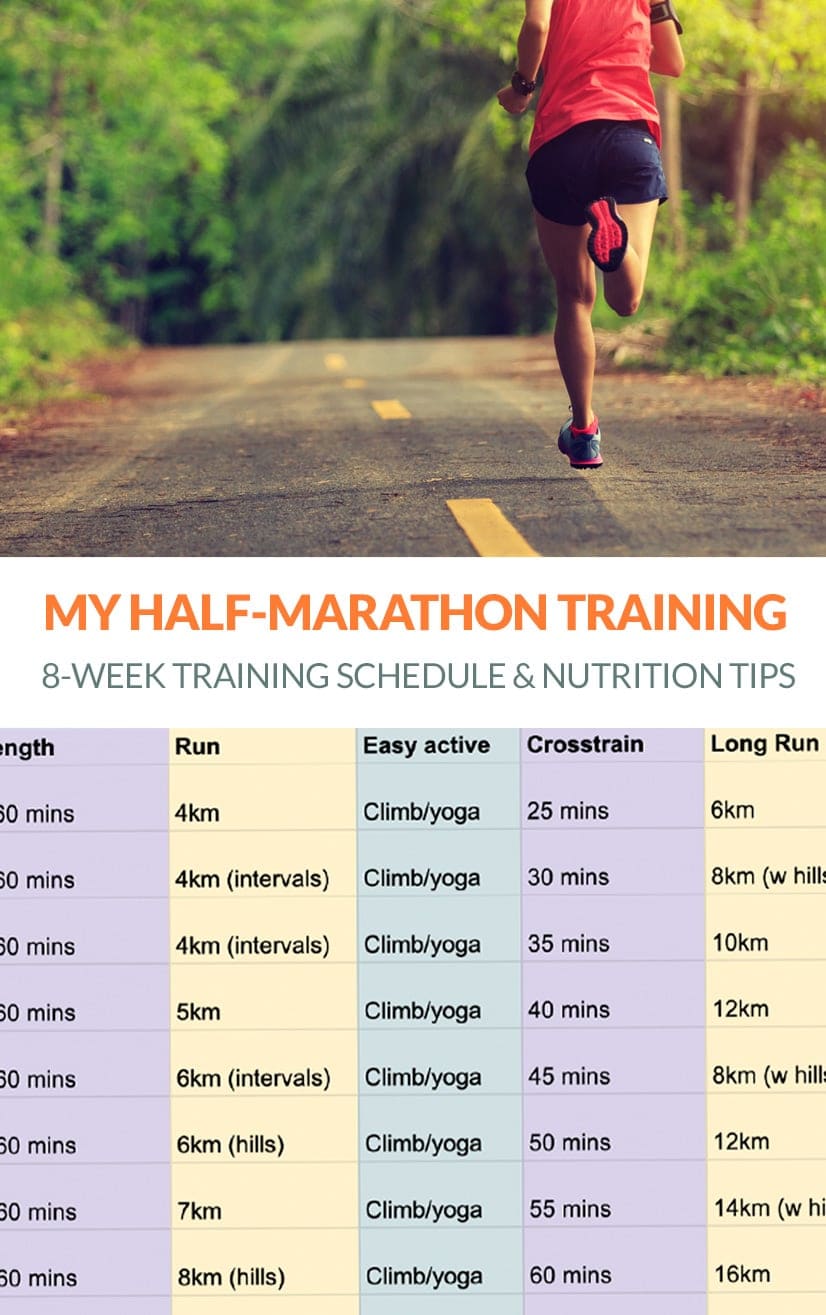



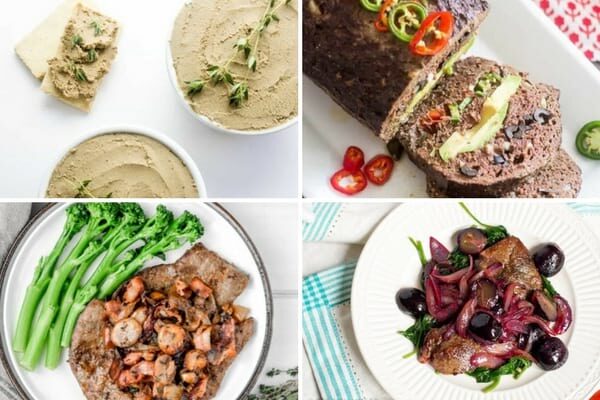
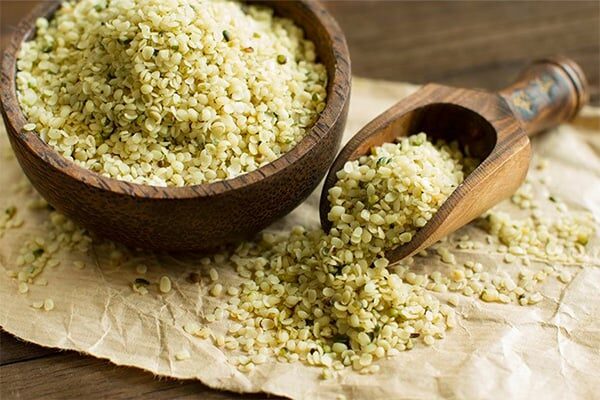


Good luck Irena!!
Make sure you grab a copy of Roar by Dr Stacy Sims.
She’s a legend in the female sports nutrition and performance science world.
Thanks so much for the sports nutrition info. I follow LCHF and have been trying to find what works for me during training and races. I’m 62 and swim about 8km a week and I’m doing theCape Town Cycle Tour for the the 9th time .. 109km cycle. Which could take 5 and a half hours so training rides can be long 3 hr cycles. I’ve had to get my head around some carb during those sessions and have found dates, potatoes, some biltong(salty dried beef) and electrolyte drinks have been my recipe for better energy long term and limited cramps. It’s really not easy finding info on nutrition for endurance sports for normal people (not athletes) so a BIG THANK YOU
Hey Julie, I’m glad it was helpful. I agree with you, there isn’t enough simple ‘how-to’ info out there. When I did my nutrition for sports course, I had so many lightbulb moments of ‘Oh, I did that wrong’ or ‘Oh, that totally makes sense’. I’m hoping to put together a few more articles on this blog about pre and post-workout meals for sports enthusiasts. Biltong is a great idea as it also replenishes those lost salts and is easy to carry around, I’ll have to get some.
With cyclists, many of them actually train LCHF but carb load for big races so sounds like you’re doing something similar.
PS. I hope I can be as active as you when I’m 62, very inspiring 🙂
Hi, great information. I’m doing a half marathon this Sunday. What’s your opinion on running a long distance run under a fast?
It depends on how fat adapted you are. If you eat low-carb and keto consistently and your body is well adapted to accessing fat for fuel then you can do longer distances at moderate/low intensity fairly well. If you just fast a few times a week, then you might struggle a little bit. One of the recommendations and practices I see is people training in a fasted mode (say in the mornings) doing low to moderate intensity runs for shorter periods of time (under 45-60 minutes) but then carb-loading before the longer runs/races and if you plan to do medium length runs at a faster pace.
Hi! This is so helpful for a beginner like me. Thank you so much.